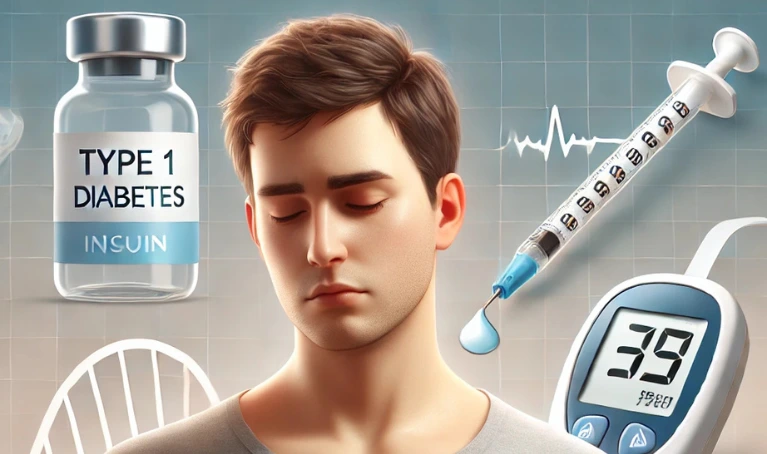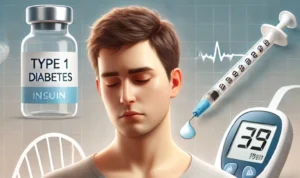Table of Contents
ToggleType 1 diabetes is a chronic condition that affects millions of individuals worldwide, often beginning in childhood or adolescence. Understanding its symptoms and causes is crucial for early diagnosis and effective management. Recognizing this condition early can help prevent serious complications such as nerve damage, kidney disease, and cardiovascular issues. This article provides a detailed explanation of Type 1 diabetes symptoms and causes, and how YourMealMate can support your journey toward better health, helping you lead a more comfortable and active lifestyle.
What is Type 1 Diabetes?
Type 1 diabetes is an autoimmune condition where the body’s immune system mistakenly attacks and destroys insulin-producing beta cells in the pancreas. Without insulin, the body cannot regulate blood sugar levels effectively, which can lead to serious complications like nerve damage, heart disease, and eye problems. It often develops during childhood or adolescence, but it can occur at any age, making it crucial to recognize its signs early. Unlike Type 2 diabetes, Type 1 diabetes is largely unrelated to lifestyle choices like diet or weight and requires lifelong insulin therapy for survival and health maintenance.
Type 1 Diabetes Symptoms
Recognizing the symptoms of Type 1 diabetes early can prevent serious and life-threatening complications. Below are 10 common symptoms that you should not ignore:
1. Excessive Thirst (Polydipsia)
Experiencing frequent and unquenchable thirst is one of the hallmark symptoms of Type 1 diabetes. This happens because high blood sugar levels cause dehydration, forcing the kidneys to work harder, and the body craves more fluids to compensate for the loss.
2. Frequent Urination (Polyuria)
When blood sugar levels are too high, the kidneys work overtime to filter and remove the excess glucose, leading to increased urination. This symptom often occurs both during the day and at night, causing inconvenience and discomfort.
3. Unexplained Weight Loss
Even if your appetite remains normal or increases, you may notice weight loss because the body starts breaking down fat and muscle for energy due to a lack of insulin. This rapid weight loss can also weaken the immune system and make you more susceptible to infections.
4. Extreme Fatigue
A lack of insulin prevents glucose from being converted into energy, leaving individuals feeling constantly tired. This exhaustion can affect daily activities, work performance, and overall quality of life.
5. Blurred Vision
Elevated blood sugar levels can lead to fluid shifts in the eyes, causing temporary changes in vision clarity. If untreated, this can result in more serious eye complications over time, including diabetic retinopathy.
Also Read: Health Benefits of Lemon and Cucumber Water
6. Increased Hunger (Polyphagia)
Despite eating normal or larger portions, individuals may feel persistently hungry because their cells are not receiving the glucose they need for energy production. This cycle can lead to frustration and difficulty in maintaining a balanced diet.
7. Slow-Healing Wounds
Cuts, sores, or bruises that take longer than usual to heal may indicate impaired immune function due to high blood sugar. This can increase the risk of infections and other complications if not managed promptly.
8. Tingling or Numbness in Hands and Feet
Prolonged high blood sugar levels can damage nerves, leading to sensations of tingling, numbness, or even pain in the extremities. This is a warning sign of diabetic neuropathy, which can progress if untreated.
Helpful for you: Common Weight Loss Myths
9. Irritability or Mood Changes
Blood sugar fluctuations can directly affect mood, often causing irritability, confusion, or even symptoms of depression. Managing diabetes effectively can help stabilize emotions and improve mental health.
10. Nausea and Vomiting
When the body starts breaking down fat for energy, it produces ketones, which can build up in the blood and lead to a condition called ketoacidosis. This condition is life-threatening and requires immediate medical attention to prevent further complications.
Causes of Type 1 Diabetes
The exact cause of Type 1 diabetes is still not fully understood, but various factors are believed to contribute to its development. Here are 10 potential causes to consider:
1. Autoimmune Response
Type 1 diabetes occurs when the immune system mistakenly identifies insulin-producing cells as harmful and attacks them, leading to their destruction over time. This process is often slow, starting years before symptoms appear.
2. Genetic Factors
A strong family history of diabetes increases the risk, as specific genes have been linked to the likelihood of developing the condition. These genetic markers may interact with other environmental or biological triggers.
3. Viral Infections
Certain viral infections, such as those caused by enteroviruses, may trigger an autoimmune response that results in the onset of diabetes. These infections are thought to disrupt the immune system’s normal functioning.
4. Environmental Triggers
Exposure to certain environmental factors, such as toxins or pollutants, may influence the development of diabetes in genetically predisposed individuals. These factors can disrupt pancreatic function and insulin production.
5. Pancreatic Damage
Illnesses or injuries affecting the pancreas can significantly impair its ability to produce insulin, contributing to diabetes onset. Chronic inflammation of the pancreas may also increase risk over time.
6. Low Vitamin D Levels
Studies suggest that a deficiency in vitamin D during childhood may increase the risk of developing autoimmune conditions like Type 1 diabetes. Maintaining adequate vitamin D levels may help reduce this risk.
Also Read: Best Vitamin D-Rich Foods
7. Stressful Events
Both emotional and physical stress can act as triggers for Type 1 diabetes by accelerating immune system dysfunction. Managing stress effectively may help lower the risk in susceptible individuals.
Also Read: How to Stop Stress Eating
8. Early Childhood Diet
Limited breastfeeding or early exposure to cow’s milk and certain dietary proteins may contribute to the risk of diabetes. These factors may influence the development of the immune system in early life.
9. Presence of Autoantibodies
Autoantibodies found in the blood can indicate an increased likelihood of developing Type 1 diabetes before symptoms appear. Regular screening in high-risk individuals is essential for early intervention.
10. Hormonal Changes
Significant hormonal shifts, such as those during puberty or pregnancy, may influence the onset of autoimmune diseases, including diabetes. Monitoring hormonal levels can help manage risks.
Must Read: How Foods Affect Your Hormonal Health
How YourMealMate Can Help You Manage Type 1 Diabetes
At YourMealMate, we specialize in providing expert guidance for managing Type 1 diabetes through personalized nutrition. Our tailored meal plans focus on maintaining balanced blood sugar levels while accommodating your taste preferences and lifestyle. By incorporating scientifically-backed strategies and offering consistent support, we help individuals make sustainable dietary changes that improve their overall health. With our online nutritionist services, you gain access to professional advice that simplifies meal planning and empowers you to lead a healthier, more fulfilling life.
Conclusion
Type 1 diabetes is a serious condition that requires lifelong attention and proper management. By understanding its symptoms and causes, individuals can take steps toward early detection and effective treatment, improving their quality of life. Recognizing warning signs like excessive thirst, frequent urination, or unexplained weight loss can make a significant difference in avoiding severe complications. Although there is no cure yet, advancements in treatment, combined with the right nutritional and lifestyle strategies, make it possible to live a healthy, active life. Support from resources like YourMealMate can further enhance your ability to manage the condition confidently and sustainably.
FAQs
What is the main cause of Type 1 diabetes?
Type 1 diabetes is primarily caused by an autoimmune reaction where the body attacks its insulin-producing cells. Factors like genetics and environmental triggers also contribute.
Can Type 1 diabetes develop at any age?
Yes, although Type 1 diabetes is more common in children and adolescents, it can develop at any age, including adulthood.
How is Type 1 diabetes different from Type 2?
Type 1 diabetes is an autoimmune condition where the pancreas produces little to no insulin, while Type 2 diabetes is often related to lifestyle factors and insulin resistance.
Is Type 1 diabetes hereditary?
While genetics play a role, having a family history of Type 1 diabetes does not guarantee you will develop it. Other factors, like environmental triggers, are also involved.
What are the complications of untreated Type 1 diabetes?
Untreated Type 1 diabetes can lead to complications such as nerve damage, kidney failure, heart disease, vision problems, and diabetic ketoacidosis (DKA).





